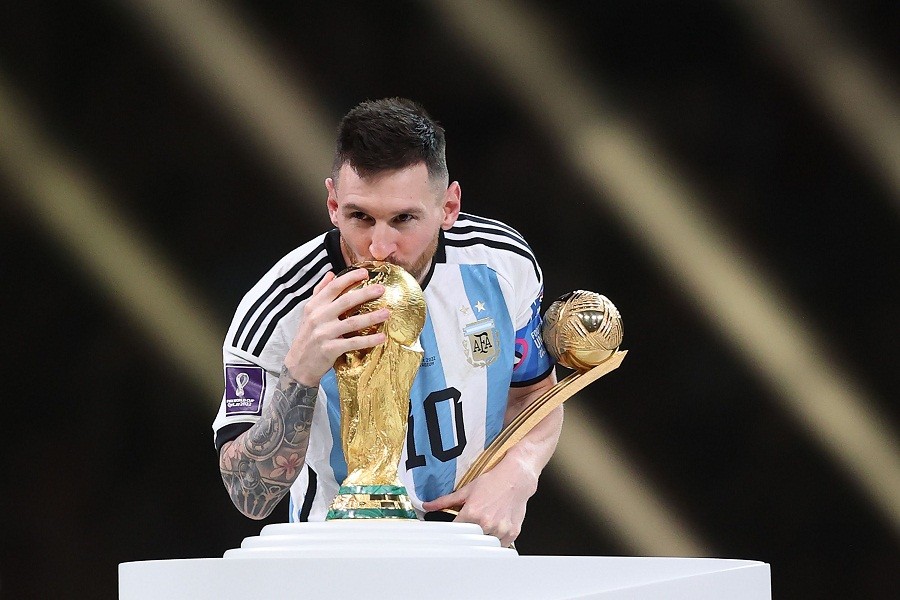The spirits lifted above on the haunting night at Maracana descended to Lusail, chanting all around. As the dawn rises, resilient sky blue starts to pierce through the night sky.
The streets of Buenos Aires are vibrant, as are the streets of Dhaka.
Fate pulled its strings in the most dramatic way possible – Angel Di Maria, the winger, the Albicelestes, sorely missed in their previous final, starred in Sunday's grand finale as he earned a penalty and later scored a stunner.
In the twilight of his career, Lionel Messi has finally kissed the ever-so-elusive World Cup trophy. As Argentina redeemed itself after 8 years of anguish for being bowed out of the 2014 World Cup final with a 113th-minute Mario Gotze masterclass, the thrilling unfolding of the final witnessed football finally gracing its greatest son with the only crown missing from his hall of fame.
Who would have thought the team that kicked off their World Cup campaign with a shocking setback against Saudi Arabia would eventually be crowned champions?
The Scaloni army did, and they showed the world their record of going unbeaten for 36 matches before the World Cup was no fluke. The sky-blues gradually enhanced their display of fine football with each game, and Scaloni once again focused on playing the opponents, adopting different formations and tactics for each game.
At 6 pm local time, the Albicelestes charged into the Lusail Stadium with all guns blazing. Argentine wingers, led by Di Maria and Messi, started rampaging through the french defence line from both sides early on.
Following extreme pressure built on the attacking third, Ousmane Dembele made the first error by grounding Di Maria in the D-box, and Messi netted the ball flawlessly.
Les Bleus soon found themselves under the heat once again as a Messi-created flick was crossed picture-perfectly by Mac Allister to find Di Maria's boot before it rocketed off to hit the net for the second time.
In a short span of 97 seconds, Mbappe scored twice, one from a spot kick and the other from an awe-inspiring volley, to enliven the french spectators at the Lusail Stadium. The game eventually proceeded to extra time despite Messi's late efforts, which the seasoned Hugo Lloris brilliantly thwarted.
30 minutes of extra time were no short of drama either as Messi tapped in an impressive goal to breathe a sigh of relief in the Argentine dugout, but yet another Mbapped penalty soon equalised it. The game would have ended right in the 120th minute if it hadn't been for the heroics of Emi Martinez, who denied Kolo Muani's attempt with a full-fledged stretch of legs, and the redemption of the sky blues seemed to be destiny.
In a nail-biting shootout, Argentina eventually prevailed to bring glory to Buenos Aires. After the final whistle, Messi slumped to the ground, bursting into tears.
The Albiceleste squad, which was tagged as mediocre by many, encircled Messi from all around, just as they did in this historic campaign.
But unlike in 2014, this time, the tears were of unbounded happiness. The staff let out tears in the dugout, fans in the stand, and patrons in front of their television sets.
For those supporters who had countless heartbreaks of not crossing the finishing line, the tears spoke of those of Di Maria in 2014, who helplessly sat in the dugout as he watched his squad be denied the glory from a peaking distance.
The tears flashed back those of Messi after the excruciating defeat in the Copa America 2016 final against Chile in the penalties.
For an occasion as big as this, the gods of football had little option but to rewrite history. Argentina went on to elevate the trophy in a gorgeous closing ceremony at the same venue where they startled against Saudi Arabia, with Messi draped with a Bisht of Emir.
For the prayers of millions around the world, football redeemed itself as the little boy from Rosario, on behalf of every little boy wearing his shirt, finally climbed onto a galaxy of his own.


